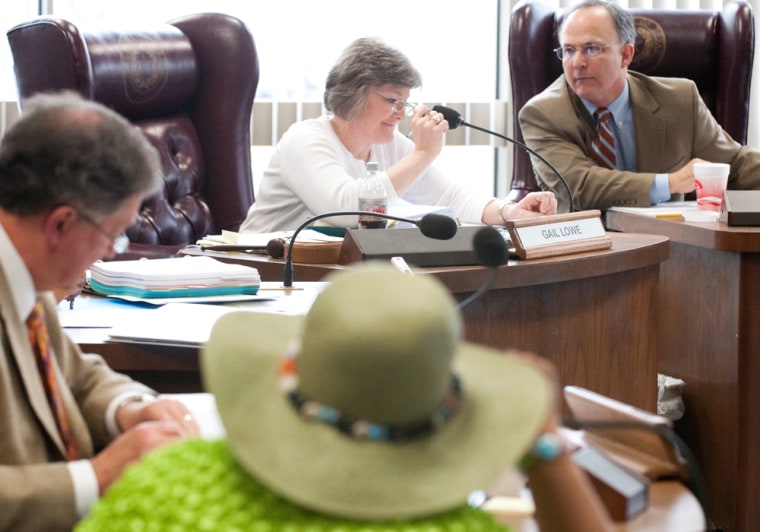Is Texas on the verge of rewriting history, or just correcting it?
The answer depends on whom you listen to on the state’s Board of Education, which is poised to vote this week on new social-studies curriculum standards that could significantly shape what Texas children — and perhaps those outside the nation's second-largest state — are taught in the classroom.
Social conservatives on the 15-member Republican-dominated board are optimistic they will be able to push through curriculum changes that, according to board member and conservative Texas lawyer Cynthia Noland Dunbar, “promote patriotism.”
Among the recommendations facing a final vote: adding language saying the country's Founding Fathers were guided by Christian principles and including positive references to the Moral Majority, the National Rifle Association and the GOP’s Contract with America.
Other amendments to the state's curriculum standards for kindergarten through 12th grade would minimize Thomas Jefferson's role in world and U.S. history because he advocated the separation of church and state; require that students learn about "the unintended consequences" of affirmative action; assert that "the right to keep and bear arms" is an important element of a democratic society; and rename the slave trade to the "Atlantic triangular trade.”
"The standards are looking real good now. We've made some significant improvements, and I am proud of what the board has done," board member Don McLeroy, author of many of the changes backed by social conservatives, told the Dallas Morning News.
The board holds a final public hearing Wednesday. It will consider amendments Thursday before a final up-or-down vote Friday on the curriculum document. More than 200 people have signed up to testify, and more than 20,000 comments on the proposed changes have been received, said Suzanne Marchman, spokesperson for the Texas Education Agency.
"There are a lot of people who are concerned and want to share their information with the board," she said.
Not in our state
Because of Texas’ sheer size, the education board’s decisions could reverberate across the nation. Texas is the country's second-largest textbook buyer, behind California, and textbooks written to comply with Texas standards are sold in many other states.
Already, a California lawmaker has introduced legislation to prevent changes ordered by the Texas school board from being incorporated in California texts.
Sen. Leland Yee, D-San Francisco, says the Texas changes are historically inaccurate and dismissive of the contributions of minorities.
"While some Texas politicians may want to set their educational standards back 50 years, California should not be subject to their backward curriculum changes," Yee said.
But some publishing industry experts say worries that the Texas standards will cross state lines are unfounded.
"It's an urban myth, especially in this digital age we live in, when content can be tailored and customized for individual states and school districts," Jay Diskey, executive director of the schools division of the Association of American Publishers, told The Associated Press.
Diskey said the California Board of Education's existing review process is so rigorous that the state "may be the last place that would end up with the Texas curriculum."
'Founded under God'
Texas school board member Dunbar, who home-schools her children and says sending them to local schools would be like “throwing them in the enemy’s flames,” says the changes she backs are all about “fighting for our children's education and our nation's future."
"In Texas we have certain statutory obligations to promote patriotism and to promote the free enterprise system. There seems to have been a move away from a patriotic ideology,” she said in a recent interview with the U.K. Guardian. “There seems to be a denial that this was a nation founded under God. We had to go back and make some corrections."
Mavis Knight, a liberal member of the education board, has accused the social conservatives of trying to insert their political and religious views into the standards "whether or not it was appropriate."
"They're trying to indoctrinate with American exceptionalism, the Christian founding of this country, the free enterprise system. There are strands where the free enterprise system fits appropriately but they have stretched the concept of the free enterprise system back to medieval times,” he told the Guardian.
Regardless of the board’s vote, the influence of the social conservatives could be waning in Texas. For three and a half years, social conservatives have held seven of the 15 board seats and usually could count on picking up one or two votes from among the three other Republicans and five Democrats on the panel, according to the Dallas Morning News.
McLeroy was defeated in the March GOP primary by Thomas Ratliff, who has been critical of the social conservative bloc and promises a less dogmatic approach. Ratliff faces only a Libertarian candidate in the fall.
Also, Dunbar did not seek re-election, and her chosen successor lost the GOP primary to former educator Marsha Farney. Farney faces a Democrat and a Libertarian in the general election.
Those changes are expected to leave no more than five social conservatives on the board beginning in January.
